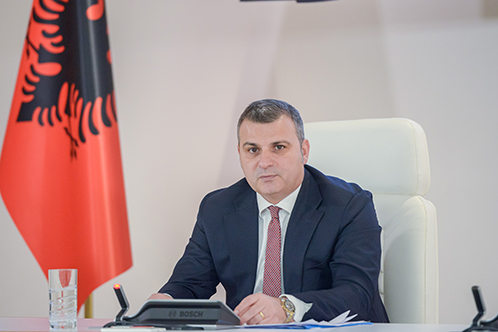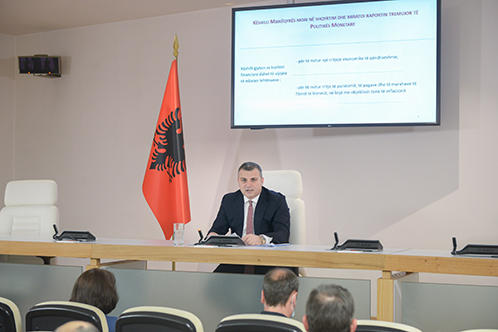BANK OF ALBANIA
PRESS RELEASE
Governor Sejko: Statement to the Press Conference on the Monetary Policy Decision
Publication date: 05.05.2021
Dear Ladies and Gentlemen,
Today, on 5 May 2021, the Supervisory Council of the Bank of Albania reviewed and approved the Quarterly Monetary Policy Report.
The new information analysed in this Report shows that the recovery pace of economic activity accelerated and the economic outlook has been improving during the last two quarters. The Supervisory Council considers that this performance reflects: (i) the flexibility of the Albanian economy and the stability of its financial system; (ii) the support provided by the monetary, financial and fiscal stimulus; and, (iii) recently, the reduction of containment measures and the increase of confidence in response to the vaccination process.

Nevertheless, the Supervisory Council notes that - in the current stage – the economic rebound is incomplete and the supportive factors are yet unconsolidated. The consequences of the pandemic in economy remain notable, being reflected in: the still low levels of the aggregate demand; the fall of employment; and the increase of unemployment. In addition, inflation remains below our 3% target.
In this view, the Supervisory Council deems that the monetary policy stance should continue to be accommodative. The monetary stimulus will serve to bolstering consumption and investments, which in turn will fuel the rise in employment, wages, and profit margins, in line with our inflation target.
***
Overall the new information, in the last months, has been in line with our expectations, although the growth of economic activity was somewhat higher and inflation rate was somewhat lower.

Inflation recorded a swift and unexpected fall in January, due to the reduction in the prices of food items. The recovery of these prices in the next period led inflation increases in February and March, but the average rate of this indicator was low in the first quarter, at 0.9%. On the other hand, core inflation was stable, around 1.5%, thereby suggesting that the fluctuations in food prices will have only transitional effects on inflation.
According to INSTAT data, the volume of the economic activity in Albania grew by 3% in the last quarter of previous year, after three consecutive quarters being downwards. The expansion of consumption, investments and exports underpinned the economic growth, which was reflected in the improvement of production and services activities. The available data for the first quarter are only indirect, but they signal the continuation of economy recovery, as shown by the improvement of economic agents’ confidence; fiscal accounts; and trade flows.
Although set on an upward path, aggregate demand remains below the pre-pandemic levels and inadequate to fully utilise production factors. Consequently, economic activity in Albania contracted by 3.3% during 2020, the Albanian economy lost around 43,000 jobs, while unemployment rate jumped at 11.8%. Also, the increase pace of both wages and other production costs has slowed down.
The weakness of aggregate demand and economic cycle called for a strong and coordinated response from the macro-economic policies.
Fiscal stimulus of 2020 was in the form of temporary tax facilities, supply of sovereign guarantees and increase of current and capital expenditure. For 2021, the fiscal stimulus is in the form of capital expenditure’s growth, for supporting the reconstruction and infrastructure development programme. Fiscal data of the first quarter are in line with this performance, thereby showing a simultaneous expansion of both fiscal revenue and spending also of budget deficit.
On its side, the Bank of Albania provided the necessary monetary stimulus to guarantee the smooth functioning of financial markets and further boost lending to economy. In addition, the temporary and targeted easing of the banking sector’s supervision aimed at and provided for further facilities to Albanian enterprises and households, in the form of a half-yearly moratorium on credit payments and encouragement for its restructuring.
Monetary and financial stimuli have been passed through at a good level. Hence, monetary conditions in economy have been and continue to remain accommodative. Financial markets function calmly and interest rates continue to be close to historical minimums, notwithstanding the short-term fluctuations. Also, exchange rate appears stable. In particular, banking sector has continued to fund enterprises and households, by reflecting both the soundness of balance sheets and the suitable reaction of this sector against the shock. In March 2021, the non-performing loans ratio dropped to 8%, recording the lowest rate since 2009, and by reflecting the soundness of real sector's balance sheets.
Credit to private sector grew annually 7.5%, on average, in the first quarter. This growth was broad-based, boosted by the expansion of lending to both segments: households and enterprises. In this context, it should be emphasised that the increase of loans for investment purposes is encouraging to the economic growth in the future. Also, the progressive expansion of credit share in lek, whose indicator to total stood at 50% in March, provides positive signals regarding the increase of monetary policy’s effectiveness and financial stability.
Our forecasts for the outlook remain positive. The continuation of vaccination process in Albania and globally, monetary and fiscal stimulus, and the return of confidence at historic levels, will open the way to the progressive expansion of economic activity in the next years. The baseline scenario of forecasts projects the economy to recover at a stable pace during 2021 and 2022, following the contraction being suffered in 2020. The acceleration of: family consumption; exports of goods and services; and the upward private investments, are expected to lead the expansion of activity. In turn, both employment and wages are expected to trend upwards, by enabling inflation to converge to target within 2022.
***
The Supervisory Council deems that the full recovery of economy and the stable increase of inflation towards the target should continue to be supported by a simulating profile of economic policies. Judging on these factors, the Supervisory Council of the Bank of Albania finds that the current accommodative stance of the monetary policy remains adequate, for bolstering economic growth and for the stable return of inflation to target.
In this view, the Supervisory Council decided to:
- Keep the policy rate unchanged, at 0.5%;
- Keep the overnight deposit and overnight lending rates, unchanged at 0.1% and 0.9%, respectively.
In addition, the monetary stimulus will benefit from maintaining the current form of unlimited liquidity injections at fixed price to the banking sector, at least during the third quarter of this year.
Also, the Supervisory Council concludes that the balance of risks continues to remain on the downside over the short run, while medium-term risks appear more balanced. In particular, downside risks, in the short run, arise from:
- a lower than expected improvement of epidemiological situation in Albania and globally;
- problems arising in the monetary policy transmission mechanism, in the form of slower credit supply growth; and
- a slower reaction by enterprises and households towards the improved financial conditions.
For these reasons, the Supervisory Council highlights that the monetary policy stance will continue to remain accommodative throughout the medium-term horizon. Any timely normalisation of monetary policy will be cautious, by neither compromising the stability of economic recovery and nor damaging the prospects for inflation return to target.
Finally, the Supervisory Council reiterates that the gradual normalisation of economic situation and the strengthening of recovery stability should put on the focus of the decision makers the need for accelerating the agenda of structural reforms. These reforms should aim at enhancing competition; further improving the investment climate and business environment; and the long-term strengthening of public finances stability. They are the sole instruments which will enable a long-term solid growth of the Albanian economy.

 Twitter
Twitter
 Youtube
Youtube
 Facebook
Facebook
 Flickr
Flickr
 RSS
RSS
 Subscribe
Subscribe
 Feedback
Feedback